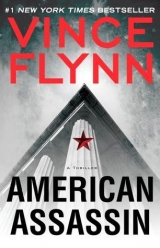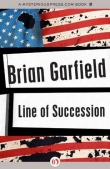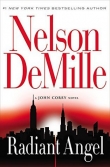
Текст книги "American Assassin"
Автор книги: Vince Flynn
Жанры:
Триллеры
,сообщить о нарушении
Текущая страница: 17 (всего у книги 26 страниц)
CHAPTER 41
ZURICH, SWITZERLAND
THEY had drinks in the library, although Rapp thought of it more as shots like he had done back in college, except instead of a smelly bar in upstate New York he was in a mansion on the outskirts of one of the most refined cities in the world. Herr Ohlmeyer did not believe in ruining fine spirits with anything other than ice, so the liquor was served either up, on the rocks, or neat, which Rapp learned was basically naked, meaning nothing but the booze. Rapp chose a glass of sixteen-year-old Lagavulin single malt scotch and asked for it on the rocks. Ohlmeyer liked playing host and told Rapp it was a fine choice. Rapp took the glass, smiled, and said, “Thank you.”
Greta had not made her entrance yet, so Rapp took the opportunity to corner Hurley, who was standing by the massive granite fireplace speaking with one of Ohlmeyer’s two sons. He approached Hurley from behind and tapped him on the shoulder. “We need to talk.”
Hurley said something to Ohlmeyer’s son in German that Rapp did not understand, and after he had walked away, Hurley turned to Rapp and asked, “What’s up?”
Rapp jerked his head in the direction of the small soundproof office. “What was that all about?”
Hurley’s jaw clenched as was his habit when he didn’t want to talk about something. Reluctantly he said, “It’s part of the deal. Don’t worry. Just listen to Carl, he knows what he’s doing.”
“Does Irene know about it, or Spencer Tracy, that guy who I’m not supposed to know?” That was how Rapp referred to the man he had met briefly at the offices of International Software Logistics, the man who, he assumed, was running the show. The question caused the veins on Hurley’s neck to bulge, which in turn caused Rapp to take a step back. That particular physical cue was often a precursor to Hurley’s blowing his top.
Hurley felt the older Ohlmeyer’s eyes on him and told himself to take a deep breath through his nose and exhale through his mouth. It was a trick Lewis had taught him. It helped him center himself. Ohlmeyer despised public outbursts. “Listen, kid … this is a tough business. There’s certain things they don’t need to know about, and quite frankly, don’t want to know about.”
Rapp considered that for a second before asking, “Can it get me in trouble?”
“Pretty much everything we do can get in you in trouble with someone. This is about taking care of yourself. No one else needs to know about this other than Carl and his two boys.”
Rapp took a sip of his scotch and was about to ask another question, but thought better of it. Don’t look a gift horse in the mouth.
Hurley wished he could say more, but the kid would have to figure it out the hard way, as he himself had had to do back in the day. He took a big gulp of bourbon and thought about how much easier it would have been if someone had just pointed a few things out to him. Hurley changed his mind and decided to let it fly. “Kid … you’re good, and that’s no small thing coming from me. My job is to find faults and try to beat them out of you. At some point in this line of work … I don’t care how good you are … I don’t care how just your cause … sooner or later you’re going to land yourself in a big pile of shit. It might be your fault, although more than likely, it’ll be some asshole back stateside out to make a name for himself so he can advance his career. He’ll put a target on your back, and trust me on this one, even though you’re going to want to stand and fight, you need to run. Run and hide … lie low … wait for things to blow over.”
“And then what?”
“You live to fight another day, or maybe you just disappear for good.” Rapp frowned, and Hurley knew exactly what he was thinking. “We’re not that different, kid. The idea of running away for good isn’t in our veins, but it’s nice to have options. You bide your time, you find out who it is who’s out to get you, and then you go after them.”
Rapp absorbed the advice and looked around the courtly library. “When are we shipping out?”
“Tomorrow morning. I was going to tell you guys later.”
“Where to?”
“Back to the scene of the crime.”
“Beirut?” Rapp whispered.
“Yep.” Hurley held up his glass. “Although I might have a small job for you first.”
“What kind of job?”
“We might have a lead on someone.”
“Who?”
“I don’t want to say yet.”
“Come on!”
“Nope … no sense in getting your hopes up. Irene is flying over in the morning to brief us. If she’s verified it, I will send you on a quick one-day detour, and then you can join up with us in Beirut.”
“And the intel on Beirut?”
“It’s good … really good. These guys have been singing like birds all day.”
The men spent another thirty minutes in the library. Ohlmeyer took the time to introduce both of his sons to Rapp and Richards. The older one was August and the younger was Robert, and both were vice presidents at the bank and held positions on the board. The patriarch of the family assured the two young men that they could trust his sons, and Hurley seconded the opinion. Ohimeyer knew that they would be leaving in the morning and suggested that they reconvene at the earliest possible time to work out the protocols and to make sure that each man understood the details of his various legends.
CHAPTER 42
SHORTLY before seven they moved from the library to a sitting room that was decorated in the French Baroque style. The white, carved flowers, leaves, and shells on the furniture and molding were in stark contrast to the deep natural woods of the library. Sitting on one of the room’s four sofas was Greta. Next to her was an older woman whom Rapp took to be her grandmother, and thus Carl Ohlmeyer’s wife.
Greta smiled at him from across the room. Rapp, in control of his faculties this time, flashed her a crooked grin and walked over, shaking his head. “Good evening, ladies.” Rapp offered his hand again. This time it was dry. “Greta, you look lovely.”
“Thank you, Mitch … I mean Mike.”
Rapp laughed, “You’re good.”
“I’d like you to meet my grandmother, Elsa.”
Rapp offered his hand. “Very nice to meet you, Frau Ohlmeyer. You have a lovely home.” Rapp thought he noticed something wrong with her eyes when she smiled. A certain disconnect. Her grip was also a bit weak, and he wondered if she might be ill.
Herr Ohlmeyer was suddenly at Rapp’s side. “Michael, I see you have met Greta.”
“Yes, we bumped into each other this afternoon.”
“And my wife.” Ohlmeyer placed a hand on her shoulder
“Yes.”
Looking back at his granddaughter, he said, “Greta is our pride and joy.”
“I can see why. She is very sharp.”
“Yes, and so far the only one of my grandchildren who has shown any interest in getting into the banking business.”
For the next five minutes, Rapp got the family history. Carl and Elsa had two boys and two girls. One daughter was married and lived in London and the other was divorced and in Spain. August and Robert’s wives were currently on vacation with their sister-in-law at her Spanish villa. There were eleven grandchildren, of which Greta was the third-eldest. Elsa did not speak, although she did smile a few times. Richards, Hurley, and the two brothers were at the opposite end of the room, no doubt discussing matters of far greater importance, but Rapp didn’t beat up on himself too badly. Standing this close to Greta was worth it. Every chance Rapp got he stole a look. Her high ponytail had been changed out for a loose clip in the back that made her look much more mature than when he’d met her earlier in the day. She was wearing a cobalt-blue silk blouse and a black skirt with gray tights. He thought Herr Ohlmeyer caught him at least once ogling her and he had no idea what Elsa was thinking. She just kept smiling at him with that faraway look in her eyes.
The Ohlmeyers were kind enough not to ask him any personal questions about his own family, as he would have been forced to tell them a lie. Herr Ohlmeyer decided it was time to sit for dinner. He asked for his wife’s hand, but before she stood, she pulled her granddaughter close and whispered something in her ear. Greta giggled, while her grandmother pulled away and flashed Rapp an intriguing smile, before pulling her granddaughter close again. She whispered another few lines before finally taking her husband’s hand and standing.
Elsa took a step toward Rapp, and to his surprise, she reached out and gently patted him on the cheek. She gave him a warm smile and then walked away without saying a word.
Rapp turned to Greta. “You have a very interesting grandmother.”
Greta reached out and grabbed his arm, pulling him close and walking him toward the dining room, but in no rush to catch up with the others. “Granny Elsa is an amazing woman. Unfortunately, she is not well.”
“What’s wrong?” Rapp said, as his stomach did flips over Greta’s touch.
“She has Alzheimer’s.”
“I’m sorry.”
“No need to be sorry. These things happen. Such is life.”
“I suppose,” Rapp said, turning toward her. She smelled so good, he wanted to bury his face in her mane of shiny blond hair.
“She has no regrets. She led a very active life up until just a year ago. I am living here now and working at the bank. This way I can spend time with her … while she still remembers me.”
“That’s nice.”
“We spend our evenings going through letters and photos. There is so much family history that only she knows. My grandfather is a brilliant man, but he has a hard time remembering the names of his own grandchildren.”
“Not yours. You can tell, he thinks the world of you.”
“Well … I work for him. I would hope he remembers my name.”
As they entered the dining room, Rapp said, “Do you mind me asking what your grandmother whispered in your ear?”
Greta gave him a nervous laugh and rested her head against his shoulder before releasing his arm. “Maybe after a few drinks.”
Rapp followed her like a puppy dog down the right side of the long table. There were chairs for twenty but they were only eight, so they clustered at the far end with Carl at the head of the table and Elsa to his left, followed by Greta and Rapp. Hurley was to Carl’s right, followed by August, then Richards, and finally Robert.
The wine glasses were filled and conversations that had been going continued while new ones were started. Richards got Rapp’s attention at one point and gave him a you-lucky-bastard shake of his head while darting his eyes at Greta. Rapp for his part struck up a rather boring conversation with Greta’s uncle, who was sitting directly across from him. When Greta had finished her glass of wine Rapp leaned over and asked, “So can you tell me now.”
Greta slid her hand over and patted his thigh. “One more glass, I think.” She held up her glass and one of the servants filled it. “So how does an all-American boy such as yourself end up in this nasty line of work?”
“We get recruited like any other profession.”
“So your background is military?”
Rapp shook his head and smiled. “I’m a fine arts major with a minor in poetry.”
Greta’s face lit up in surprise for a moment and then she caught herself. “You are teasing me.”
“Yes, I am.”
“Why?” she asked playfully.
“Because you know I can’t talk about my past … and I tend to tease people whom I like.”
“So, you like me?” she said with an approving nod.
He didn’t know why he decided to say it. Maybe it was the wine, maybe it was his newfound confidence that he was finally making a difference, that he was part of something important, but he did nonetheless. Rapp leaned in close so only she could hear and said, “I don’t know what it is about you, but I’ve had a hard time thinking of anything but you, since we met this afternoon.”
She smiled at him, her cheeks flushing just a touch. “You are different. Not so guarded.”
Rapp laughed. “I’m probably the most guarded person you’ll ever meet. Just not with you, for some reason.”
“Is that good or bad?”
“I think it’s good. At least it feels good.” Rapp looked into her blue eyes. She was smiling back at him. He was about to really open up when Herr Ohlmeyer tapped his wine glass with his knife several times and stood. Ohlmeyer raised his glass and started giving a toast. Rapp turned his chair slightly so he could face him, and his right knee moved to within a few inches of Greta’s thigh. Then her left hand slowly slid over from her lap and found his knee. From that moment on, Rapp didn’t register a single word that came out of Herr Ohlmeyer’s mouth. Nor did he hear anything Hurley said when he rose to make his toast.
The main course arrived. It was a braised beef of some sort, served with mushrooms, potatoes, gravy, and vegetables, the kind of meat-and-potatoes meal Rapp loved. There was only one problem. He had just stuffed a forkful of beef in his mouth when Greta leaned over and told him what her grandmother had whispered in her ear.
“My granny thinks you are extremely attractive. She told me I should sleep with you.”
Rapp would have been fine if it had ended there, but it didn’t. As he tried to swallow the meat Greta leaned over once more.
“She said that if I don’t she will.”
Rapp froze, his eyes bulged, and a piece of meat got stuck in the crossroads of his throat. His brain’s autopilot kicked in and the hunk of meat came flying back up as fast as a major-league fastball. The only thing that saved it from pelting Richards in the face was Rapp’s quick hands. A fit that started out as a cough morphed into eye-watering laughter. Greta smacked him on the back a few times and had to hold her napkin over her mouth to conceal her own laughter and amusement that she had set the chain of events in motion. Conversation ceased and all eyes settled on the young duo.
Greta saved them by announcing, “I am sorry.” She dabbed at her eyes. “I told him a bad joke.”
Rapp finally got hold of himself and everyone went back to their conversations. Rapp noticed Hurley giving him a few cautious looks, but other than that no one appeared to notice the flirting. Shortly after dessert was served, Elsa tapped Greta on the arm and told her she was tired. Everyone stood while the two women made their exit, and then Ohlmeyer suggested they retire to the library. Hurley disappeared into the small soundproof office, and it was Rapp’s turn to talk with the two uncles. They gave Rapp a message service to call if he needed to contact them. He was never to call the office directly, especially if he was in trouble. Rapp kept looking over his shoulder, hoping to see Greta, but she did not return. About an hour into it the brothers thought they had made enough progress and agreed they would sit down again when Rapp came through town again in the coming weeks.
It was just before ten when the two brothers left. Rapp thanked Herr Ohlmeyer for an interesting evening and headed upstairs with one thing on his mind—Greta. He stood in the long hallway outside his room for a moment, loitering, hoping she would suddenly appear. He had no idea where her room was, but suspected that the guests were in this wing and the family’s rooms were in the other wing of the house. After another fifteen seconds of standing there feeling stupid, he gave up and opened his door.
Rapp peeled off his suit coat and tie, draping both over the back of the desk chair. With the water running, he started brushing his teeth and unbuttoning his white dress shirt. He walked back into the bedroom and was dropping the dress shirt on top of the tie and coat when he thought he heard a sound at the door. He froze, hoping it was Greta. A few seconds later he heard the footsteps of someone walking away. He walked to the door and listened for a few seconds before checking the hallway. It was empty. Rapp closed the door and stood there resting his head against the door. After nearly a minute he decided he was acting like a fool. He twisted the lock from midnight to three and climbed into the big bed, wishing Greta was next to him.
He yawned and rubbed his eyes. He was tired after all. Rolling over, he extinguished the bedside lamp and thought about tomorrow. The side trip that Hurley had alluded to had his interest. He wondered who the target was, and if he’d had a direct role in the Pan Am attack. The happy thoughts of ending that type of man’s life sent him drifting off toward sleep, and then suddenly there was a faint knock on the door.
Rapp threw back the blankets and rushed to the door. The knocking grew a bit louder. Rapp twisted the lock and opened the door a crack. The sight of Greta’s blond hair put an instant smile on his face. She pushed through, not wanting to be discovered in the hall, closing the door behind her and locking it.
Rapp opened his mouth to speak, but she put a finger on his lips and a hand on his chest. She pushed him back toward the bed, and then, rising to her toes, she kissed him on the mouth. Rapp responded with a soft gasp and pulled her close, wrapping an arm around her waist. Hands started to roam and the kissing became intense, and then Rapp pulled her head back and rested his forehead against hers. He looked into her eyes, but before he could speak, she gave him a wicked smile and pushed him back onto the bed.
Rapp watched as Greta undid her robe, letting it fall to the floor. She was naked. He reached out for her, and she slowly climbed onto the bed. He pulled her close, kissing her neck and running a hand down her perfect, smooth, naked backside. A low rumble of approval passed his lips as he nibbled on her ear and then other parts. Holding her tight, he took control and rolled over. Rapp held her exquisite face in his hands and looked into her eyes. At that moment there was nothing beyond the here and now. There was no yesterday, or tomorrow. He hadn’t felt this alive in years.
CHAPTER 43
BEIRUT, LEBANON
THEY were to meet two hours after sunrise. Sayyed asked Mughniyah why two hours, and he told him it was because the cowardly Americans only attacked with the cover of darkness and the Jewish dogs with the rising sun at their backs. Sayyed had seen the Jews attack at all hours of the day but he wasn’t going to argue with Mughniyah, at least not considering his current mood.
Sayyed looked down at his little CIA guinea pig. The man was not doing well. None of the nails had grown back enough to use the pliers, so he’d been forced to drill a hole through one of the agent’s nail beds to try to get him to respond to his questions. Instead the man had passed out. There were parameters in these situations, but they were only parameters. You could never tell when you had an outlier. On that note, Sayyed still wasn’t sure about Cummins. Given the less than sanitary conditions, it was entirely possible that he was seriously ill. Aziz al-Abub had taught him how a subject could become sick to the point of the nervous system shutting down. Once that happened, the only thing you could do was nurse the subject back to health and then start over.
Unfortunately, Mughniyah and the others wanted answers that were simply not here. At least not in Cummins’s head. They were distrustful of Ivanov and his constant plotting, but there was still a deep-seated hatred of the Americans and Jews, and they wanted to know if this man knew anything about their missing money. Beyond that there was a fundamental problem that they had overlooked, which was not unusual for the collective group. They were far too one-dimensional and always looked at a situation as if it were a street battle in Beirut. Attack, retreat, dig, and fight—this was the extent of their military repertoire. In the espionage business Sayyed had to analyze in three dimensions and project possible outcomes. This John Cummins was going to eventually end up in the hands of Ivanov, if for no other reason than that Ivanov was used to getting his way. Sayyed had to be very careful what type of questions he asked, with an eye to the fact that the subject would eventually inform Ivanov of what he’d been asked.
Sayyed would have to start the subject on a cycle of antibiotics. The others could talk all they wanted about not handing Cummins over, but Sayyed was done with him. There was nothing more to learn and he did not wish to be put in the middle of this fight. He wiped the small splotch of blood on the front of the white butcher’s apron and wondered what he should tell Damascus. They would want to be fully briefed on the situation, but they did not have to deal with all of these crazy Palestinians.
That was the paradox of Lebanon in general and Beirut specifically. The Palestinians were supposed to be in Palestine, not Lebanon. The Palestinians had upset the balance that the Turks had kept for centuries. Their displacement by the Jews shattered the fragile peace and plunged the country into civil war. And now more than fifteen years later, that civil war was over and the Palestinians were growing cocksure. With relative peace, Damascus was losing its sway over how all these vying factions conducted themselves. Damascus, for its part, was slow to realize what was plain to see. The child was now an adult and did not appreciate, much less need, the consent of the parent. Fortunately for Sayyed, he was more like an uncle—a very nonjudgmental uncle. Especially this morning.
Sayyed knocked on the metal door and waited for it to be opened by the guard. He stepped into the hallway and closed the door behind him. Looking at the two guards, he said, “He will need medical attention. Pass the word to the others. I want him treated like a baby. No more kicking or punching.”
The two men nodded and Sayyed moved off down the hallway, still struggling with what he should tell Damascus. He could hardly share the details of the past few days. The Swiss accounts that had been so carefully set up were now empty. Damascus had contributed zero to the accounts, but they were aware of their existence. They did not know, however, that Sayyed had set up an account for himself with the aid of Sharif and Ivanov. He took a cut of every arms shipment that came into the country by helping assure that the various Syrian factions would leave the merchants be. Damascus needed to be kept in the dark as long as possible.
He stopped in the small sandbagged lobby on the first floor. The door was completely blocked and the floor-to-ceiling windows on each side were now nothing but small portholes, just enough to allow a man to take up a rifle position. Oh, how he wished those pesky Maronites would go away. He climbed to the second story and followed the extension cords and phone lines to the makeshift command post. Once again the hallway was filled with armed men, but this time they did not upset Sayyed. He needed them to deter the Christians from doing anything stupid.
They were living in abject squalor. There was no running water, electricity, or phone service. The men were relieving themselves in the basement in random rooms and corners. No wonder Cummins was sick. Electricity and phone service would have to be brought in from three blocks away, via a series of patched cords and lines that had been spliced into the service of an apartment building.
The guards stepped aside so he could pass, and he entered the command post. The men were standing around a sheet of plywood that had been placed on top of two fifty-gallon oil drums—Mughniyah and Badredeen from Islamic Jihad; Jalil, who was Sayyed’s Iranian counterpart; and Radih from Fatah. Each man had benefited handsomely from his association with the Turkish arms dealer and now they were once again paupers.
“Close the door,” Mughniyah commanded.
Sayyed did so, and joined the men at the makeshift table.
“Well?” Mughniyah asked.
“Nothing.”
“Nothing?” Radih asked, obviously dubious.
Sayyed looked at the little toad from Fatah and said, “I have been informed that some of your men have taken certain liberties with my prisoner over the past few days.”
“Your prisoner?” Radih shouted. “He is my prisoner!”
“The prisoner,” Sayyed said, “has been kicked and brutalized by your men and due to the lack of sanitary conditions from your men defecating all over the basement like a pack of wild dogs, it appears the prisoner is now ill.”
Badredeen made a foul face and said, “Really … you should institute some basic hygiene. At least have the men go on the roof. The sun will take care of it for you.”
“Do want to walk up seven flights of stairs to go to the bathroom?” Radih asked.
“Enough,” yelled an impatient Mughniyah. He looked from one end of the table to the other, making it clear to all that he was not in the mood for petty arguments. “Someone has stolen millions of dollars from us and you want to argue about where the men should shit?”
“I was only—”
“Silence!” Mughniyah screeched. With his fists clenched he turned on Radih. “I am sick of it … all of the complaining and fighting, the bickering, and for what … it gets us nowhere. Millions are gone, Sharif is dead, our banker is dead, and that vulture Ivanov is now talking about coming to Beirut for the first time in years. Am I the only one who finds this a bit disconcerting?”
“He told me he had nothing to do with Sharif’s murder,” Sayyed offered.
“And since when do you believe anything that comes out of a Russian’s mouth?”
“I have no trust in the man, but on this point, he did seem to be upset that someone had killed Sharif.”
“Maybe someone else did kill Sharif, and that was when Ivanov decided that with our Turkish friend gone it was the perfect time to take all of the money.”
Sayyed considered that one for a moment. It was possible. Ivanov had proven many times that he could be ruthless.
“Add to that these damn Christians deciding to make a show of strength.” Mughniyah gave a swift shake of his head. “I like none of it. Something is very wrong and we know far too little.”
“Why would Ivanov want to visit Beirut?” Badredeen asked.
“Land.”
All eyes fell on Colonel Jalil of the Iranian Quds Force. “Explain,” Mughniyah ordered.
“There is a great deal of valuable land here in Beirut, and many are saying that with war finally behind us, there are huge sums of money to be made.”
“Why can’t these people leave us alone?” Mughniyah asked no one in particular.
“What about the Americans?” Radih asked. “We have one of their agents in this very building.”
“Who was sent here to negotiate the release of the businessman you kidnapped.” Sayyed’s tone suggested what he thought of the idea.
“That is the story he has given you.”
Sayyed turned his head to look at Radih. “You doubt my ability to get the truth out of people?”
“None of us are perfect.”
“So you think the American is holding back on us? That his coming here is all part of a master plan by the Americans to take over Beirut?”
“I did not say that.”
“You did, in so many words.” Looking back toward the leaders of Islamic Jihad, he said, “We do not have enough information to know what is actually happening. It could be anyone at this point, but based on what we do know, we have to assume that Ivanov is the front runner.”
“So what should we do?” Badredeen asked.
Sayyed thought about it for a moment and then said, “Let him come to Beirut. Keep our eyes and ears open and see what we can find out.”
Mughniyah was scratching his beard thinking about what had been said. “Beirut is our fortress. Spread the word to our people at the docks and the airport. I want to know of anything that looks suspicious. Americans, Russians, Jews … I don’t care.”
“And we should alert our allies,” the Iranian said. “Everyone should be extra careful until we know exactly what is going on.”
“I agree,” Mughniyah said. “Quietly spread the word to our people in Europe. Especially anyone who has a connection to Sharif. Let them know of our concerns … that someone might be targeting us.”
It was the right decision, but Sayyed needed to add something. “No mention of the money, though. At least not yet.” One by one they all nodded as he knew they would. To a man, they were too proud to admit that they had been duped out of such a large sum of money.








